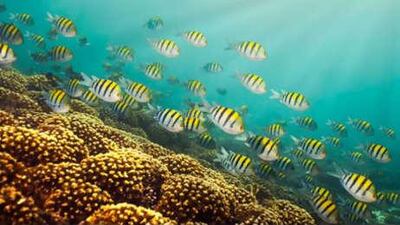Glistening against the dark blue of the Gulf of Oman off the coast of Fujairah, the rocky outcrop looks so tranquil few would suspect its dramatic recent history. To find the source of the drama, swim out from the sandy beach opposite the reef known as Dibba Rock and dive down - a few metres with a mask and snorkel or, for the more adventurous, 10 to 15 metres deep with scuba gear. "It used to be an underwater paradise," said Christophe Chellapermal, a keen scuba diver, who first saw the reef 15 years ago.
Dibba Rock is about half a kilometre away from the shore, surrounded by coral on all sides. The reef varies in depth from four to 15 metres. It is the only marine protected area on the UAE's east coast. Mr Chellapermal was lucky enough to have seen it before June 2007, when cyclone Gonu destroyed more than 90 per cent of the coral. In August the following year, patches of red, coloured by millions of microscopic marine algae, appeared. They grew and covered the coastline from Dibba to Muscat in Oman. The concentrations blocked sunlight to the reefs and killed most of what Gonu had spared.
On Dibba Rock, the contrast between before and after was stark. The sea floor used to be covered by dark-red and brownish Staghorn coral. When the algal bloom receded in March last year, only the white skeletons of the coral remained. "The site has changed quite a lot," said Andrew Jubber, manager of Freestyle Divers, the dive centre nearest to Dibba Rock. "Obviously, Gonu and the red tide did a lot of damage."
The good news is that the reef is recovering. Although the coral will take years to grow, most of the reef's other inhabitants are back. These vary from tiny colourful creatures to the world's largest living fish - the whale shark. Clown fish live in pairs among the tentacles of polyps, known as sea anemones. The whale sharks only drop by in spring when an abundance of plankton attracts them to the coastal waters.
"There was this stage in April and May when we saw whale sharks every Friday," said Mr Jubber. "You have an excellent chance to see turtles and black-tip sharks all year round." While life has returned, the extent and speed of the recovery depends on whether authorities address some of the man-made impacts. On July 27, an oil slick was carried to the area, one of at least six that Mr Jubber had seen this year. It is suspected the pollution is caused by ships washing tanks illegally. Authorities claim the practice is happening in international waters and not much can be done to stop it. In addition, some visitors seem unaware of how brittle the coral is and walk on it. Fishermen are a problem too, although the area has been protected from fishing by the Ministry of Environment and Water and Dibba Municipality.
"I have seen people fishing and spear-fishing," said Mr Jubber. "We went a couple of weeks ago on a Friday and some guys were picking up oysters and left with two big bags. "There are half-moon fishing pots and it is possible to drop the pot inside the reserve but put the buoy outside. No one will know it is there." An official from Dibba Municipality denied violations are happening. "We have radars and cameras watching ... there are people watching and covering the area and making sure it is protected," he said.
Ibrahim al Zu'ubi, adviser to the Emirates Diving Association, said the association has had talks with the local fishermen's association on the issue. "It is a community responsibility," he said. "At the end of the day we do have an ecosystem that we have to protect not only for the sake of the environment, but also because it is the source of our food and business." Despite the assurances, Mr Jubber said he was not relying on Dibba Rock to be the main attraction for his customers.
"Our future is the Mussandam Peninsula," he said. @Email:vtodorova@thenational.ae

